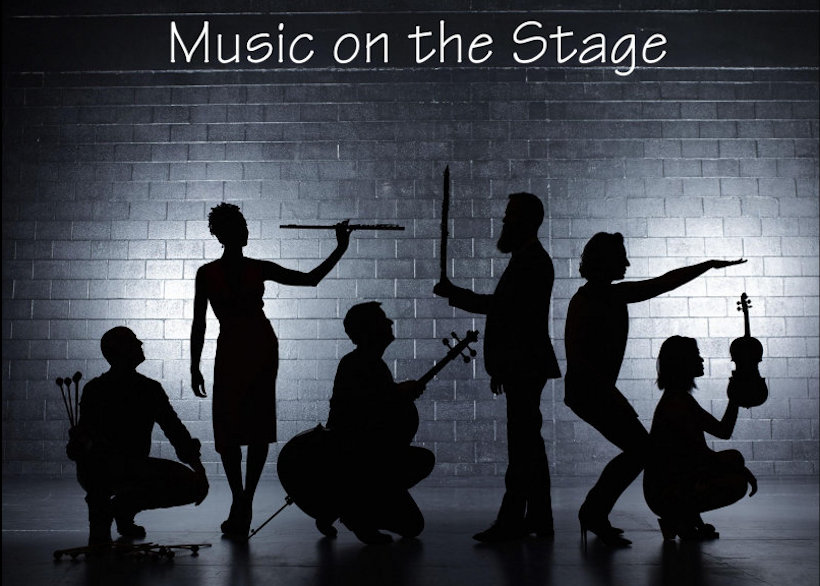9. Immigrant Broadway.
West Side Story (1956) is surely the iconic depiction of immigrant culture on the Broadway Stage. And it was largely
created by people who, like Leonard Bernstein and Jerome Robbins, had been born in this country to immigrant parents.
A decade before, in 1946, immigrant composer Kurt Weill had attempted something similar with Street Scene, though
shaping it as an opera. A decade before that, second-generation immigrant George Gershwin had depicted another working-class
community in another opera, Porgy and Bess (1935), though his subjects were African-Americans rather than recent arrivals
from Europe. And a decade before that, in Show Boat (1926), Jerome Kern and Oscar Hammerstein depicted yet
another group of Black dock-workers as an ingredient in a show that, for all its theatrical glitter, portrayed serious aspects of
American life.
For most of the century, the Broadway musical theater has been dominated by people who were either born in Europe, or had parents
who were. Indeed, the American musical grew out of European operetta, such as The Merry Widow (1905) by Franz Lehár,
and many of the composers who wrote similar works in America—such as Victor Herbert, Rudolf Friml, and Sigmund
Romberg—had experienced this kind of music as part of their European childhoods.
It also makes a difference when such talented immigrants came to this country. Israel Beilin was a child of five in 1893 when
his parents fled from Russia, but as Irving Berlin he became one of the quintessential American songwriters, both a keen
observer and an ardent patriot. On the other hand, Kurt Weill began his career representing the rootless chaos of Weimar Germany,
and there is a strong case to suggest that he remained essentially rootless all his life. rb.
The script, videos, and images will be posted immediately after class.
We have an unusually large group of clips today. Almost all the ones I showed in class are available, except Magnolia's
audition in Show Boat. I have also added a few things I did not show, or alternate versions of those I did show,
because they are either iconic or especially good; these are all marked with an *asterisk. As a result, we now have a
couple of trailers, some items by Rudolf Friml, some alternatives for Show Boat numbers, several other pieces
(including a synagogue service) that Weill wrote in America, and a fascinating video of Bernstein rehearsing the stars
of his West Side Story CD. For Barbara Hannigan's "Youkali," I give the complete 15-minute Mathieu Amalric film,
cued to the start of the first verse; in class, though, I played a mash-up of the two verses to avoid the visual
interruptions as much as possible. rb.
| FRANZ LEHÁR |
| |
The Merry Widow |
|
* Vilja song
(Susan Graham, not Renée Fleming)
* Ladies of the Chorus
(Kelli O'Hara)
|
| |
| VICTOR HERBERT |
| |
Naughty Marietta |
|
* Italian Street Song
(Jeannette MacDonald in the 1926 film)
* Sweet Mystery of Life
(the same, plus Nelson Eddy)
|
| |
| RUDOLF FRIML |
| |
Rose Marie |
|
* Indian Love Call
(from 1954 film)
|
| |
The Vagabond King |
|
* Only a rose
(from 1956 film)
|
| |
| SIGMUND ROMBERG |
| |
The Student Prince |
|
* Drinking Song
(voice of Mario Lanza)
* — the same, better
(Jerry Hadley, audio only, superb singing)
* Serenade
(William Olvis, from Deep in My Heart)
|
| |
Artists and Models |
|
* IT
(my section title, uploaded)
|
| |
| JEROME KERN |
| |
Show Boat (San Francisco) |
|
* Trailer
(almost 8 minutes)
* Ol' Man River
* Can't help loving that man
|
| |
Show Boat (other) |
|
* Ol' Man River
(Paul Robeson, in the 1936 film)
* Can't help loving that man
(contemporary semi-concert performance)
* You can fall back on me
(Marge and Gower Champion)
|
| |
| GEORGE GERSHWIN |
| |
Porgy and Bess |
|
* Summertime
(Golda Schultz, Met 2020)
* Met trailer
|
| |
| IRVING BERLIN |
| |
Yip Yap Yahank |
|
* We're off to France
(WW1 army musical)
|
| |
This is the Army |
|
* This is the army, Mr. Jones
(WW2 army musical)
|
| |
Annie Get Your Gun |
|
* There's no business like show business
(Betty Hutton in 1950 film)
* Anything you can do, I can do better
(as above, with Howard Keel)
|
| |
Other songs |
|
* Alexander's Ragtime Band
(Alice Faye in the 1938 film)
* — the same, as a jazz standard
(Gunnhild Carling & Carling Family)
* God Bless America
(Berlin at the Ed Sullivan Show)
|
| |
| KURT WEILL |
| |
Happy End |
|
* Surabaya Johnny
(Angel Blue in concert)
|
| |
Mahagonny |
|
* O Moon of Alabama
(Nadja Mchantaf, Parma Opera)
|
| |
Marie Galante |
|
* Tango interlude
(Rome Opera, 2007)
* C'est presque au bout du monde
(Matthieu Amalric film with Youkali)
|
| |
Knickerbocker Holiday |
|
* September Song
(Ute Lemper audio, authentic souns)
|
| |
[synagogue music] |
|
* Kiddush
(a rare piece of liturgical music)
|
| |
Street Scene |
|
* Opening section
(complete opera from Madrid)
|
| |
Lost in the Stars |
|
* Title song
(Frank Sinatra; from Weill's last show)
|
| |
| LEONARD BERNSTEIN |
| |
Candide |
|
* I am easily assimilated
(Pati LuPone, with Marin Alsop)
|
| |
West Side Story |
|
* Opening dance
(1961 film; longer than shown in class)
* America
(2021 film)
* Bernstein in rehearsal
(with Kiri te Kanawa and José Carreras)
|
| |
|
|
|
|
|
| IMAGES |
The thumbnails below cover the slides shown in class, though
there may be a few small discrepancies. Click the thumbnail to see a larger image.
Click on the right
or left of the larger picture to go forward or back, or outside it to close. |
 | |
 | |
 | |
 | |
 | |
 | |
 | |
 | |
 | |
 | |
 | |
 | |
 | |
 | |
 | |
 | |
 | |
 | |
 | |
 | |
 | |
 | |
 | |
 | |
 | |
 | |
 | |
 | |
 | |
 | |
Here are brief bios of the artists, composers, and writers considered in the class, listed in order of birth.
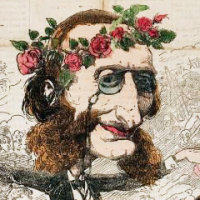 |
Jacques Offenbach, 1819–80. German-French composer.
The son of a cantor, Offenbach took the name of the German town in which he was born. After studying at the Paris Conservatoire, he began to write operettas, composing over 90 in the course of a long and wildly successful career. He is also known for his unfinished grand opera The Tales of Hoffmann.
|
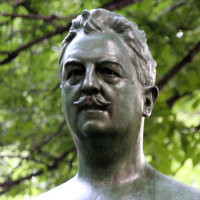 |
Victor Herbert, 1859–1924. British-American composer.
Born in the Channel Islands (though his mother told him Dublin), he went with her to Stuttgart, where he received training in cello and composition, leading to a career as an orchestral player and soloist, often in his own compositions. He came to the US in 1886 as principal cellist at the Met, and became conductor of the Pittsburgh Symphony in 194. His career trajectory changed completely in 1903, however, with the success of Babes in Toyland, the first of his many operettas.
|
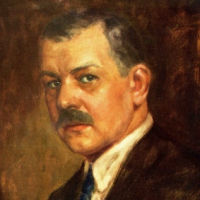 |
Franz Lehár, 1870–1948. Austro-Hungarian composer.
The son of an Austrian army bandmaster, and at first speaking only Hungarian, Lehár studied violin at conservatory, but was self-taught as a composer. Beginning in 1896, he became known for his operettas, of which the most famous is The Merry Widow (1905), a worldwide hit. Later in his career he formed a close professional association with tenor Richard Tauber.
|
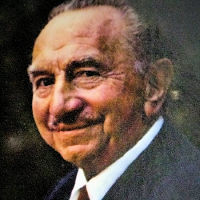 |
Rudolf Friml, 1879–1972. Czech-American composer.
A student of Anton Dvorak in his native Czechoslovakia, Friml came to the US in 1906, after several earlier visits, finding success as a répetiteur at the Metropolitan Opera and performing pianist. But he became best known as the composer of operettas, the best known being Rose Marie (1924) and The Vagabond King (1925), both of which were soon made into films.
|
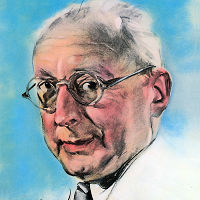 |
Jerome Kern, 1885–1945. American composer.
The son of German and Bohemian immigrants in New York, Kern became one of the most famous songwriters of his age. He also wrote several Broadway musicals, of which the most famous is Show Boat (1926), which occupied new territory by making the music support a story dealing with real issues, as opposed to being a fantasy concocted simply to contain the music.
|
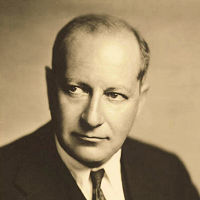 |
Sigmund Romberg, 1887–1951. Hungarian-American composer.
Born Siegmund Rosenberg in Hungary, he showed precocious talent as a musician. He came to America in his late teens, and soon began working for a music publisher, adapting European musicals for US performance. His own most successful shows, The Student Prince (1924) and The Desert Song (1926), were in a similar style, but he could also write music that was entirely American in spirit.
|
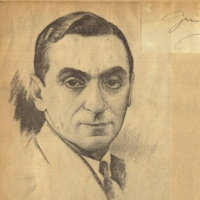 |
Irving Berlin, 1888–1989. American composer.
Berlin (b. Israel Beilin) arrived in the US from Russia at the age of 5. Although he could not read music and could barely play, he wrote over 1,500 songs with the aim, in his words, "to reach the heart of the average American." With hits like "Easter Parade," "White Christmas," "God Bless America," and the musical Annie Get Your Gun (1946), one might say he succeeded.
|
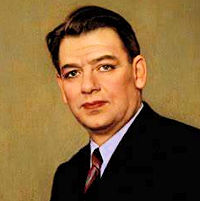 |
Oscar Hammerstein II, 1895–1960. American lyricist and producer.
Oscar Hammerstein's father, a German immigrant, was manager of the Metropolitan Opera and active also on Broadway. His son quickly established a career as lyricist, working with Rudolf Friml, Sigmund Romberg, Jerome Kern (Show Boat, 1926), and a very long partnership with Richard Rodgers from Oklahoma! (1943) to The Sound of Music (1959).
|
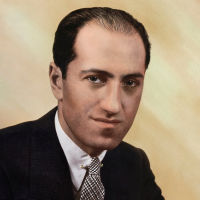 |
George Gershwin, 1898–1937. American composer.
Born Jacob Gershwine in New York to Jewish emigrants from Eastern Europe, he studied piano and composition, but soon found his vocation as a songwriter, mostly with his elder brother Ira (born 1896). Most of his songs have become crossover standards, as have his orchestral works Rhapsody in Blue (1924) and An American in Paris (1928). Most of his stage works are primarily containers for his songs, but his 1935 opera Porgy and Bess is an exception, a closely-developed study of African-American life.
|
 |
Bertolt Brecht, 1898–1956. German dramatist.
Brecht's importance to musical theater rests mainly on his collaborations with Kurt Weill between 1928 and 1932: The Threepenny Opera, Happy End, Mahagonny, and The Seven Deadly Sins. A Communist, he fled the Nazi régime, but returned after the War to found the celebrated Berliner Ensemble in East Berlin.
|
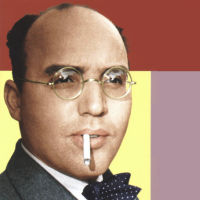 |
Kurt Weill, 1900–50. German American composer.
Weill became famous in Berlin for his collaborations with Bertolt Brecht, among them The Threepenny Opera (1928, a satirical adaptation of John Gay's The Beggar's Opera,) and the political opera The Rise and Fall of the City of Mahagonny (1930). Fleeing Nazi Germany, he eventually settled in New York in 1935, finding new fame on Broadway, but also writing more operatic fare such as Street Scene (1946, with Langston Hughes).
|
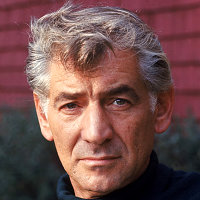 |
Leonard Bernstein, 1918–90. American conductor and composer.
Winning fame relatively young as conductor of the New York Philharmonic, Bernstein also reached wide audiences with his music lectures on television. His work as a composer ranges from Broadway musicals such as West Side Story (1957) through symphonies, operas, and his multi-media Mass (1971).
|
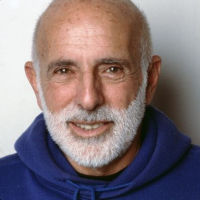 |
Jerome Robbins, 1918–98. American choreographer and director.
Beginning his career as a dancer and later choreographer with the American Ballet Theatre, Robbins later joined forces with Balanchine in the New York City Ballet. While he created numerous ballets in the classical tradition, his career on Broadway and in film is at least as important, including his work on West Side Story in both media.
|
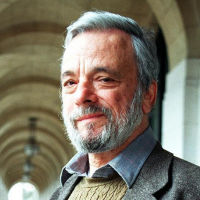 |
Stephen Sondheim, 1930–2021. American composer and lyricist.
A protégé of Oscar Hammerstein's, Sondheim made his Boadway debut in 1957 as lyricist for West Side Story, but he soon began his own string of musicals, writing the music as well as the words, including A Funny Thing Happened on the Way to the Forum (1962), A Little Night Music (1973), and Sweeney Todd (1979). Often dealing with non-traditional subjects, these and others largely redefined the Broadway in the later 20th century.
|
